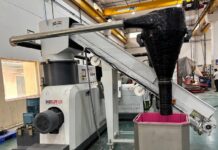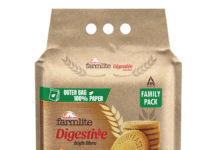
In the UK, many in the industry are vaguely familiar with the ‘circular economy’ as a concept but wouldn’t know how to apply its thinking to their own businesses or why they should even consider doing so. Tracy Sutton’s consultancy Root helps companies identify the benefits of sustainable packaging design and efficient use of resources. A visit to the pioneering cosmetics brand Lush Cosmetics at its new recycling factory on the South coast of England convinced her it is a model member of the circular economy and role model for any brand wanting to connect with customers through a shared responsibility for the environment.
A brand that’s ploughing massive amounts of company resources into sustainablepackaging principles, and producing spectacularly industry-changing results, is Lush. It is a big name in pioneering ethical manufacturing processes and has a global retail customer fan base that’s expanding as new stores open around the world selling ethically conceived, handmade personal care products and cosmetics.
I believe success comes with the responsibility to deal with the impact of increased consumption and I’m impressed that Lush has made a pact with itself – and crucially with customers – to do just that. It opened a new factory in Poole this year with a recycling facility to produce a better quality of recyclate able to go directly into its closed loop manufacturing process. Recycled polypropylene and other plastics are moulded back into pots and bottles which Lush then uses for new products.

The push to become an independent recycler came from two directions explains the senior buyer at Lush, Gabbi Loedolff, “Our drive to be wholly responsible for mitigating our environmental impact and an inability to find external partners that could meet our needs.” The challenge she told me was to find equipment that was scalable in line with the processing capacity needs of a few 100 tonnes a year, comparably small and very specific. “We also needed to bring the teams that would be working on the day to day running of it into the vision we have, to ensure people felt a part of it and saw the value it added beyond pure functionality,” added Loedolff.
Refreshingly, profit motives are completely absent from business decision-making– almost incomprehensible for most other business enterprises. “Our impact on the environment is a core belief and something we do just because it is the right thing to do and nothing more. We are doing this as an additional activity as opposed to our sole activity; we are also using the finished materials ourselves, so we are less dependent on external factors. “The ideal is to keep reusing any resource and getting as much value as possible from every ‘waste’ material. Circular economies give a degree of traceability on the origin of materials that are often otherwise completely untraceable.”

Loedolff’s advice to anyone wanting to bring circular economy thinking into the business is this, “Start small, really fix each issue and take it a step at a time. Talk to your suppliers and manufacturers to get their buy-in. The more we request post consumer materials and encourage people to experiment with making changes, the more it becomes the norm.”
I was pleasantly surprised that Lush so strongly back sup its beliefs with practical,proactive passion for sustainable packaging, and applying experience, knowledge and tenacity to try new things, undeterred by setbacks and skeptics – making it a true pioneer and one that I’d like to see many more brands learning from.










